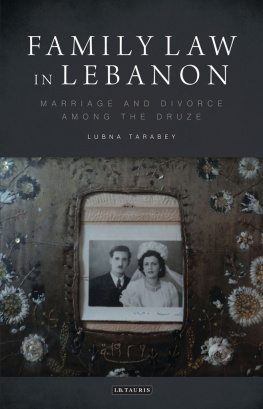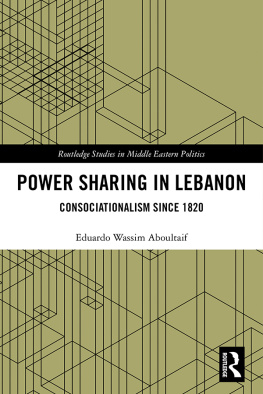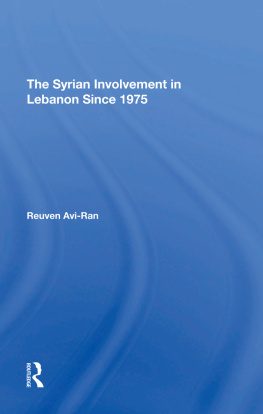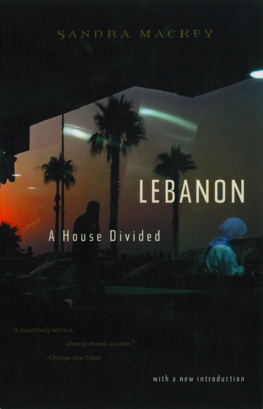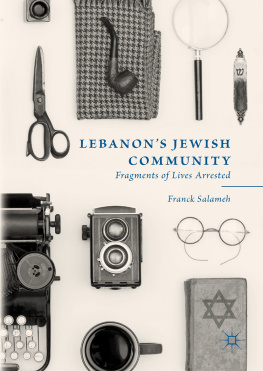A number of people whose support and assistance were crucial for the completion of this work accordingly deserve my acknowledgement.
I have to start with a word of remembrance to the late Judge of the Druze Court of Appeal, Nouhad Hariz who, along with Judge Nassouh Haydar granted me permission and access to the court records without which this research would not have been possible. Thanks are also due to all the court employees who also facilitated my work and were very helpful. I would also like to acknowledge all my informants and all the people who trusted me enough to tell their stories.
I shall forever be grateful to Sarah Vincent-Grosso who read and commented on the whole manuscript offering much appreciated advice.
I am also very appreciative of the hard work done by Ms Susan Kennedy in editing the manuscript and suggesting enlightening comments. Nadine El-Hadi at I.B.Tauris also offered helpful suggestions.
Thanks are also due to Dr Fredrick Maatouk and Dr Martha Mundy.
Last but not least, I am thankful to all my family members for their help and support. I would like to thank my grandmother, Ahsan Al-Halabi, and my late grandfather, Adel Al-Halabi, for the picture on the cover of the book. Thanks are also due to Maha Tarabey for her help. My biggest thank you goes to my two boys, Makram and Firas for appreciating that their mom had to work for very long hours.
This book is dedicated to my loving parents, Wahib and May Tarabey. Thank you for your constant encouragement.
The rate of divorce has increased drastically over the past years.
Women are asking for divorce because they are becoming more demanding. Nothing seems to be enough. They always want more.
The family is breaking down.
No one is willing to make sacrifices for the well being of the family. Whenever faced with a problem, the easiest way out is divorce.
Family values and morals are on the decline.
Young men and women think they know everything because they have attended schools. They no longer listen to the wise experienced elders.
It was comments like these, heard every day in conversations among members of the Druze community, that motivated me to study family life and its supposed breakdown among the Druze, only to find there is very limited research that tackles this topic. This led me to choose the topic of change among the Druze as the subject matter of my research. While it is certainly true that this research stems from personal interest in my own community, being a Druze, which might elicit criticism from scholars who prefer more impersonal socio-anthropological research, I find myself more inclined to agree with Maxwell (2005) when he points out that incorporating personal interests is not something one should try to avoid:
Attempting to exclude your personal goals and concerns from the design of your research is neither possible nor necessary. What is necessary is to be aware of these goals... And think of how best to deal with their influence. In addition, recognizing personal ties to the study can provide you with a valuable source of insight. (Maxwell, 2005: 19)
Nicolas (2001) agrees and clearly states that when attempting any research, a number of key features must be taken into account, first of which is that the research problem should be of interest to the researcher. Personal goals are thus a legitimate part of research, but they are not in themselves a sufficient condition for research (Nicolas, 2001: 21).
The limited nature of existing research into family change among the Druze community allows the study to meet Maxwells (2005) two other goals/categories namely the practical goal and the intellectual goal. On the practical level, research on family change among the Lebanese Druze would, if not alter, at least offer some insights into a certain problematic situation and if allowed some scope may serve as a basis for a reconsideration of laws and social practices by the Druze. While acknowledging the importance of the above factor, the most important goal of the research remains the attempt to understand certain social phenomena that give an insight into the mechanisms at play within the Druze family as revealed through a study of marriage practices and divorce choices among the Druze community the two processes being legally restricted to and structured within the Druze personal status court.
At the basis of the research lies the assumption that over recent decades the Druze way of life has not remained the same but has been challenged by ongoing changes in the Lebanese society as a whole. Over the past decade huge changes have occurred in the mass media and means of communication, and will evidently continue to do so. The increase in industrialization, urbanization (as a mental attitude, not just as a physical reality), modernization and exposure to Western ideas resulting from the rise in education and the strong pull of urbanization may be expected to have left their influence on family life. In addition, one cannot ignore the fact that the extended Lebanese civil war has also had an impact on peoples lives and choices, evident in the ever-growing trend towards migration, both temporary and permanent. This trend, while triggered by the war, has been sustained by an increased aspiration for a better standard of living.
The influence of the extended Lebanese civil war was not restricted to the economical aspect of migration. As well as destroying the physical structure of the country, it had a detrimental effect on the social fabric of Lebanon both by dividing people of different sectarian affiliations and by strengthening the sectarian identity of each group. The Druze people strongly held the common belief that they were fighting a war of existence and could not trust any other sectarian group. This feeling was shared by other groups that consequently led to a weakening of national feeling, an increase in dissent and the predominance of religious identity. The internal cohesion and solidarity of the religious group became ever more sacred and was not to be jeopardized. Although the war ended in the early 1990s, the feelings did not. They continue to shape the community and peoples emotions, as became evident during the incidents of 8 May 2008 in Lebanon.
All the above factors challenge peoples ways of life, customs and traditions. A social group that undergoes such a process must change to cope with current realities. The challenge is perhaps most strongly felt by traditional groups who try to maintain a particular way of life. For generations, the Druze way of life was characterized by a high degree of traditional practices and customs, so these changes might be expected to weigh heavily upon their traditional family life, changing it from one that was predominantly patriarchal and kin-oriented to one that is more individualistic and cognitive. In a nutshell, this study sets out to analyse whether or not such individualism reveals itself in the marriage choices and divorce decisions that are being made or taken with limited, or at least less, consideration to previous traditionally accepted norms or modes of conduct. Furthermore, the research will also shed light on any distinct trend in marriage choices and grounds for divorce as analysed through the court records.

